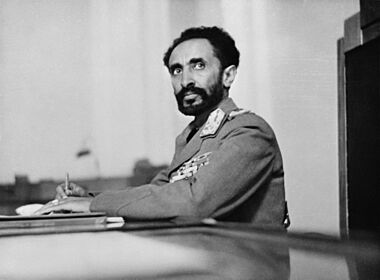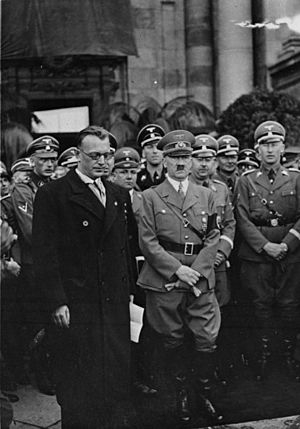Appeasement facts for kids
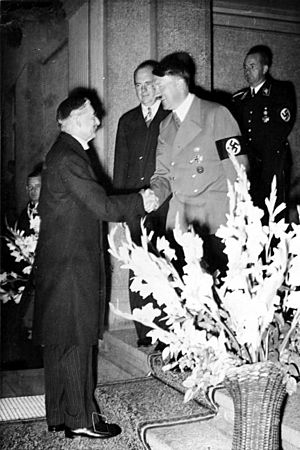
Appeasement was a way of trying to avoid war. It meant giving in to some demands from an aggressive country. The goal was to keep peace. This policy was mostly used by British leaders like Prime Ministers Ramsay MacDonald, Stanley Baldwin, and especially Neville Chamberlain. They used it towards Nazi Germany and Fascist Italy between 1935 and 1939. France also used appeasement, but it was not as popular there.
Many people supported appeasement in the early 1930s. They remembered the horrors of World War I. Some felt that Germany had been treated too harshly after that war. Also, some saw fascism as a way to stop communism. But by the time of the Munich Agreement in September 1938, many people started to oppose it. This included the Labour Party and some Conservative leaders like Winston Churchill. However, many powerful groups in Britain still supported appeasement. This included the British royal family, big businesses, and major news outlets.
As fascism grew stronger in Europe, Chamberlain tried to control what the public heard. He wanted to keep people from worrying too much. After the Munich Agreement, he famously announced that he had brought "peace for our time". People have debated appeasement ever since. Some say it was a mistake that made Adolf Hitler too powerful. Others argue that Germany was already very strong. They believe delaying a war was the best choice for Western countries.
Contents
What Was Appeasement?
Appeasement was a policy of giving in to Adolf Hitler and Benito Mussolini. Leaders hoped this would make the dictators stop their aggressive actions. But it ended when Hitler took over Czechoslovakia in March 1939. After this, Prime Minister Chamberlain decided to resist Germany.
Why Did Appeasement Happen?
Appeasement became popular because the League of Nations failed. The League was created after World War I to prevent future wars. It aimed for countries to work together and stop aggressive nations. But the League struggled when powerful leaders like Hitler and Mussolini ignored its rules. This happened when Germany sent troops into the Rhineland. It also happened when Italy invaded Ethiopia.
Japan Invades Manchuria
In September 1931, Japan, a member of the League of Nations, invaded Manchuria in China. China asked the League for help. The League asked Japan to leave, but Japan refused. Japan then left the League in 1933. Neither the League nor the United States took strong action. Some historians believe this inaction encouraged other aggressive countries in Europe.
Agreements with Germany
In 1934, Britain and Germany made an agreement about payments. This helped their economic ties. In 1935, Britain allowed Germany to rebuild its navy. This included U-boats, even though the Treaty of Versailles had forbidden it. These agreements showed Britain's willingness to work with Germany.
Italy Invades Ethiopia
Italian leader Benito Mussolini wanted to expand Italy's empire. In December 1934, Italian and Ethiopian troops clashed. Italy then invaded Ethiopia in October 1935. The League of Nations called Italy the aggressor. It placed some economic penalties on Italy. However, important resources like oil were not included. Some countries also refused to apply the penalties.
Britain and France wanted to keep Italy from joining Germany. They secretly agreed to give two-thirds of Ethiopia to Italy. But the public found out and protested. This forced the British and French leaders to resign. Italy captured the Ethiopian capital in May 1936. The League then stopped its penalties. This event greatly weakened the League of Nations.
Germany Reoccupies the Rhineland
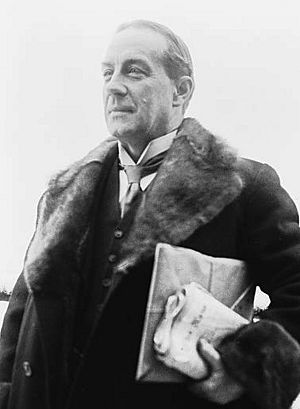
After World War I, the Rhineland area in Germany was made a demilitarized zone. This meant Germany could not have troops there. Hitler sent German troops into the Rhineland on March 7, 1936. He hoped Britain would not get involved. France protested to the League but did not act.
British Prime Minister Stanley Baldwin said Britain did not have enough forces to help France. He also felt the British public would not support military action. Many in Britain thought Germany was just moving troops into its own territory. Only the Soviet Union suggested penalties against Germany. Hitler's move made him believe that other countries would not stop him. This gave Germany a strong military position.
Spanish Civil War
Many historians believe Britain's policy of not getting involved in the Spanish Civil War was due to its dislike of communism. Others argue Britain simply wanted to stay neutral. The goal was to have good relations with whichever side won in Spain.
Key Moments of Appeasement
In 1937, Neville Chamberlain became Prime Minister. He continued the policy of appeasement and also began rearming Britain. Chamberlain's reputation for appeasement mostly comes from his talks with Hitler about Czechoslovakia in 1938.
The Anschluss
After World War I, Austria was left as a small country. Most Austrians wanted to join Germany. But the peace treaties after the war forbade this. Hitler, who was born in Austria, wanted to unite Austria with Germany. He wrote in his book Mein Kampf that he would achieve this, even by force.
In early 1938, Hitler was ready to act. He forced the Austrian leader to allow pro-Nazi officials into the government. Austria tried to hold a public vote to stay independent. Hitler demanded it be canceled. On March 12, 1938, German troops marched into Austria. They faced no resistance and were welcomed by many Austrians. Austria became a part of Germany.
Other countries reacted mildly to this. Britain and France did not use force. Chamberlain said that nothing could have stopped it unless countries were ready to fight. This event made Hitler believe he could be even more aggressive. It also showed Britain and France were unlikely to resist future German actions.
The Munich Agreement
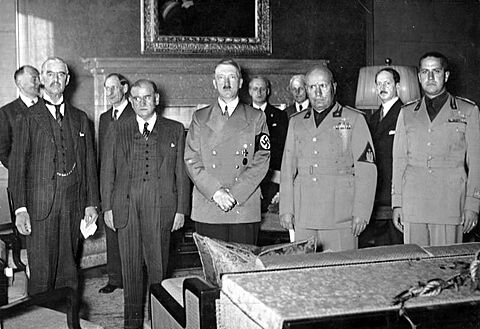
After World War I, Czechoslovakia was created. It included areas with many German-speaking people, called the Sudetenland. In April 1938, a German party in Sudetenland demanded to join Germany. This caused a big international crisis.
France and Britain advised Czechoslovakia to give the Sudetenland more freedom. Czechoslovakia refused and prepared for German attack. Chamberlain flew to Germany to talk directly with Hitler. Hitler now demanded that the Sudetenland become part of Germany. Chamberlain believed refusing would lead to war. Britain and France told Czechoslovakia to give up the German-majority areas. Hitler then increased his demands.
On September 22, Chamberlain met Hitler again. Hitler now wanted Czechoslovakia to be completely broken up. He later agreed to take only the Sudetenland by October 1. Germany then demanded this by September 28 or face war. Czechoslovakia refused. France ordered its army to prepare, and Britain prepared its navy.
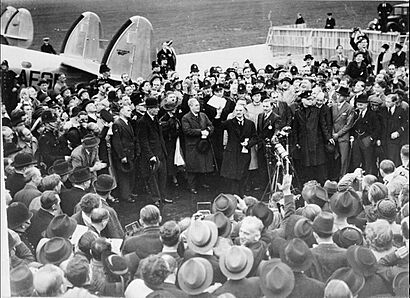
On September 26, Hitler claimed the Sudetenland was his "last territorial demand in Europe." He gave Czechoslovakia until September 28 to give up the land. As war seemed close, Mussolini suggested a meeting. On September 29, 1938, Hitler, Chamberlain, French Prime Minister Édouard Daladier, and Mussolini met in Munich. Czechoslovakia and the Soviet Union were not invited.
The four leaders agreed that Germany would take the Sudetenland. Czechoslovakia was told to accept this or face Germany alone. Hitler also signed a peace agreement with Britain. Chamberlain returned to Britain, promising "peace for our time".
Germany Takes More of Czechoslovakia
After Germany took the Sudetenland, Czechoslovakia lost many people and industries. It also lost its mountain defenses. The rest of Czechoslovakia became weak. In the following months, Czechoslovakia was broken up. Germany took more land, Hungary took parts of Slovakia, and Poland took another area. On March 15, 1939, German troops marched into the rest of Czechoslovakia. Hitler declared it a German territory. Slovakia became a country controlled by Germany.
British and French leaders had pressured Czechoslovakia to give up its land. They hoped to avoid a major war. Some believed this was a "betrayal" of Czechoslovakia. Others argued it was done to save Czechoslovakia from being completely destroyed.
Germany Takes Klaipėda from Lithuania
In March 1939, Germany also demanded that Lithuania give up the Klaipėda Region. This area had a German majority. Lithuania was warned not to seek help from other countries. Britain and France showed sympathy but offered no help. They continued their policy of appeasement. Without international support, Lithuania had to accept Germany's demand.
World War II Begins
By August 1939, Hitler was sure that democratic countries would not stop him. He invaded Poland on September 1, 1939. Britain and France then declared war on Germany. However, there was little fighting at first, a period known as the Phoney War.
Chamberlain resigned in May 1940. Winston Churchill became Prime Minister. After France fell to Germany, Hitler offered peace to Britain. Some British politicians considered it, but Churchill refused.
How People Felt About Appeasement
After appeasement failed to prevent war, it was heavily criticized. It became seen as a mistake to avoid. However, some historians now question this simple view. They argue that few leaders truly wanted "peace at any price."
Avoiding Past Mistakes
Chamberlain's policy continued earlier British efforts to keep peace. Many people believed that wars started by accident. They thought the League of Nations could prevent them. Others felt that the Treaty of Versailles had been unfair to Germany. They believed Germany had a right to some of its demands.
Government Views
Most British foreign policy leaders in the 1930s accepted appeasement. Many journalists and academics also supported it. Even members of the British royal family agreed. A fear of communism was a strong reason for some. They preferred fascism over communism.
Most Conservative politicians supported appeasement. But Churchill warned about Germany's growing military power. He believed Britain should rearm faster and resist Germany. Churchill's strong opposition to Hitler began later in the 1930s. He warned that giving in to Hitler would not bring peace or safety.
Military Views
The British navy generally supported appeasement. They did not want to spread their forces too thin. They needed to be ready for threats from Germany and Japan. In 1938, the navy felt Britain lacked the resources to fight Germany and defend its empire at the same time.
The British public feared German air attacks on their cities. The media often highlighted these dangers. Many believed that defending against bombers was impossible. However, the British air force was developing new fighter planes and radar. These were not ready yet, so appeasement was seen as a way to buy time.
In France, military leaders were worried about Germany's air force. They believed German planes were superior. They were pessimistic about defending Czechoslovakia.
Opposition Parties
The Labour Party opposed the fascist leaders. But until the late 1930s, they also opposed rearming Britain. They had many members who believed in pacifism (opposing all war). Later, they changed their view and supported rearmament.
Some on the left believed Chamberlain wanted Germany and the Soviet Union to fight each other. British communists argued that appeasement favored fascism over socialism.
Role of Media
Public opinion was partly shaped by how news was presented. Some journalists claimed their reports about Nazi militarism were hidden by their editors. A poll showing public distrust of Hitler was also censored. Chamberlain sometimes ignored or pressured journalists who asked tough questions. He even called reports about the persecution of Jews "Jewish-Communist propaganda."
Chamberlain also influenced the BBC. Radio producers were told not to offend Hitler and Mussolini. They censored anti-fascist comments. The BBC also did not report on large protests against Chamberlain after the Munich Agreement. Even after the war began, news of the persecution of Jews was censored. Chamberlain still hoped for a quick peace and did not want to worsen relations.
After World War II Began
Once Germany invaded Poland, everyone agreed appeasement was to blame. Critics said it was the fault of wealthy people and conservatives who were too soft on Hitler. A book called Guilty Men blamed 15 public figures. It said appeasement was "the deliberate surrender of small nations in the face of Hitler's blatant bullying." This book greatly influenced how people thought about appeasement.
The meaning of "appeasement" changed after Munich. It used to mean a peaceful way to solve problems. But after Munich, it meant giving in out of fear or weakness. It was seen as buying temporary peace at someone else's expense.
Later Views of Historians
Historians have tried to explain Chamberlain's policies. Some say he truly believed Hitler and Mussolini had limited goals. They think he hoped settling their complaints would prevent war.
One early different view came from John F. Kennedy. He argued that appeasement was necessary because Britain and France were not ready for a world war.
Later, historian A.J.P. Taylor argued that Hitler did not have a master plan for war. He said appeasement was an active policy. It was a reasonable response by leaders facing real problems. Other historians agreed that leaders had to choose the "lesser of evils." They believed the situation was so difficult that there was no perfect solution.
More recently, some historians argue that appeasement was the only choice for Britain. But they say it was done poorly and too late. They believe Chamberlain made a mistake by thinking he could lead Hitler to peace. They emphasize that anti-communism was a key reason for appeasement's appeal to conservative leaders.
How Appeasement is Used Today
Leaders in later years have often used the "lesson of Munich" to justify strong actions. They say they must avoid appeasement.
United States
US President Harry S. Truman used this idea to explain entering the Korean War. President John F. Kennedy used it during the Cuban Missile Crisis. Later, President Lyndon B. Johnson used it to explain fighting communism in Vietnam. Other presidents have also used it to justify military actions.
Other Countries
British Prime Minister Margaret Thatcher used Churchill's example during the Falklands War in 1982. She refused to compromise with Argentina. The idea of appeasement was also brought up during the Yugoslav wars in the 1990s.
US President George W. Bush and British Prime Minister Tony Blair used Churchill's warnings about Germany to justify the Iraq War in 2003.
See also
 In Spanish: Política de apaciguamiento para niños
In Spanish: Política de apaciguamiento para niños


